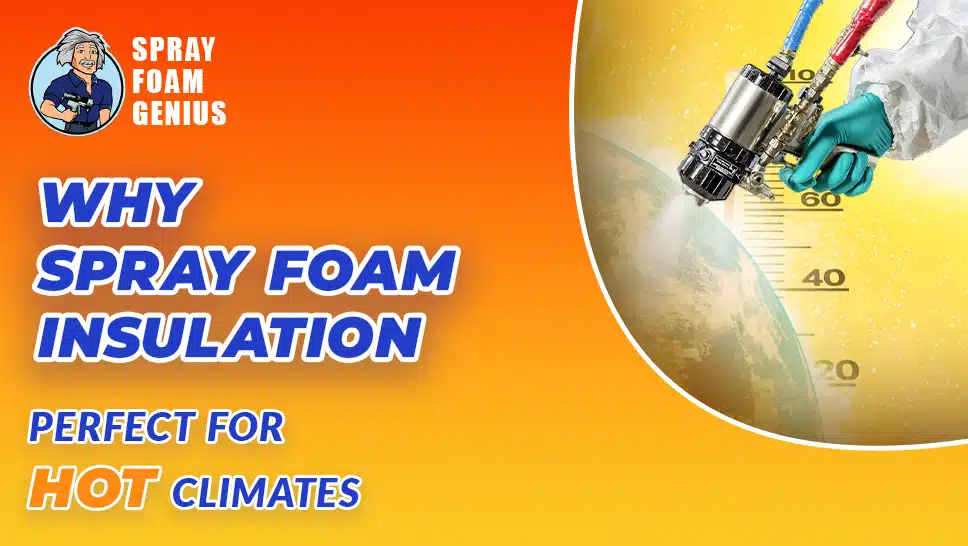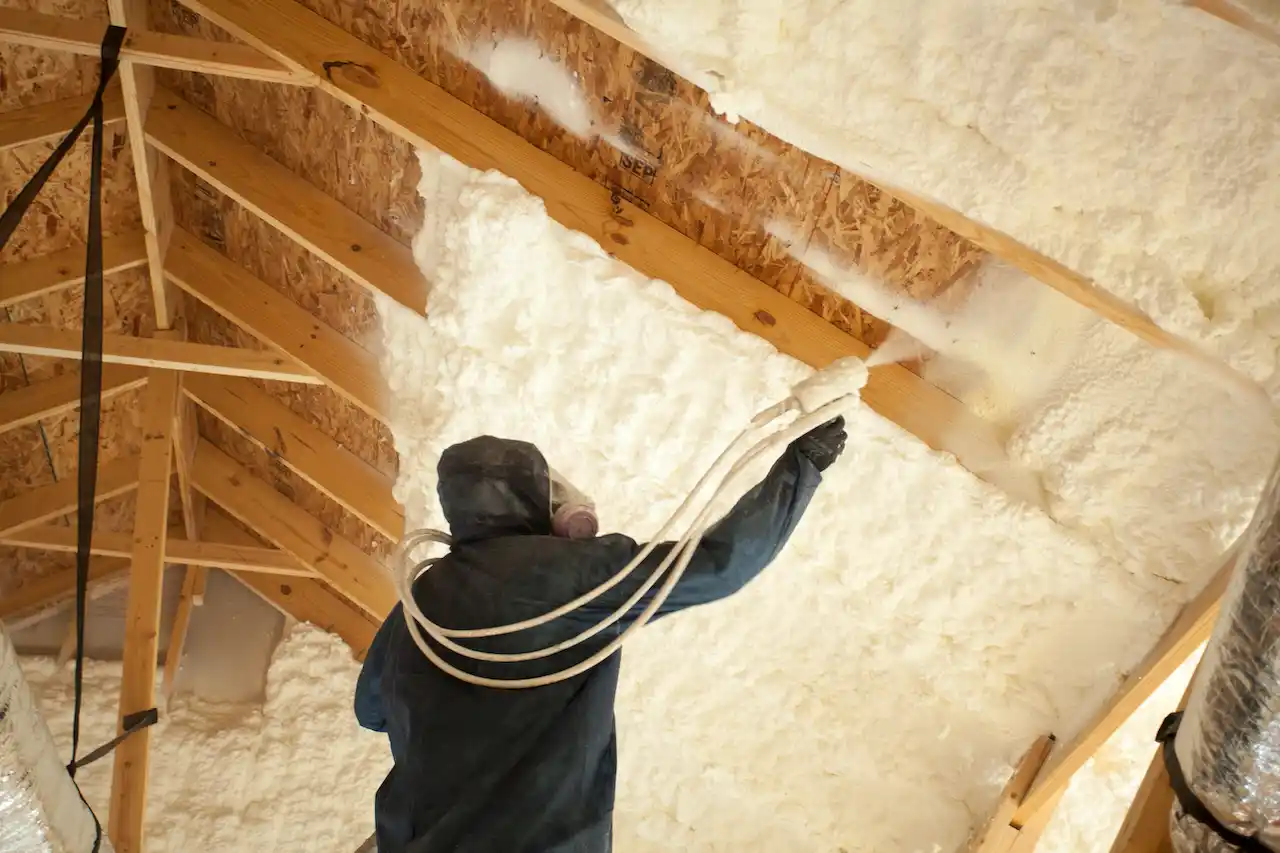
Spray foam insulation has rapidly emerged as a leading choice for improving energy efficiency and indoor comfort. This is particularly true in hot climates, where managing indoor temperatures and energy costs can be challenging. This extensive guide will explore why spray foam insulation is especially beneficial in hot climates, focusing on its thermal performance, energy efficiency, moisture control, and additional advantages.
What is Spray Foam Insulation?
Spray foam insulation is a cutting-edge insulation material made from a combination of two primary components: isocyanate and polyol resin. When these substances are mixed, they react chemically to form a foam that expands to fill gaps, cracks, and voids. This expansion creates a continuous and effective barrier that provides superior insulation.
Types of Spray Foam Insulation
Spray foam insulation comes in two main varieties, each with distinct properties and applications:
- Open-Cell Foam: Open-cell foam is characterized by its lower density and flexibility. It is known for its excellent soundproofing qualities and has a lower R-value compared to closed-cell foam. This type of foam is often used in applications where acoustic performance is important, such as in home theaters, offices, or recording studios. Open-cell foam is also more breathable, which can be beneficial in certain applications.
- Closed-Cell Foam: Closed-cell foam is denser and more rigid. It boasts a higher R-value, making it more effective at insulating against heat. Additionally, closed-cell foam acts as a moisture barrier, which is particularly advantageous in hot and humid climates. This type of foam is commonly used in applications where high thermal resistance and moisture control are crucial, such as in roofs, walls, and floors.
Why Spray Foam Insulation is Ideal for Hot Climates
Superior Thermal Performance
In hot climates, managing indoor temperatures effectively while keeping energy costs under control is essential. Spray foam insulation excels in this area due to its high thermal performance.
- High R-Value: The R-value of insulation measures its ability to resist heat flow. Spray foam insulation, especially closed-cell foam, has a high R-value per inch of thickness. This means it provides exceptional resistance to heat transfer, keeping indoor spaces cooler in hot weather. For example, closed-cell spray foam typically has an R-value of around 6 to 7 per inch, compared to fiberglass batts, which offer an R-value of about 3.2 to 4 per inch.
- Seamless Barrier: Traditional insulation materials, like fiberglass batts or foam board, can leave gaps and seams where heat can penetrate. Spray foam expands to fill every gap and crack, creating a seamless barrier that effectively prevents hot air from infiltrating your home or building. This seamless nature ensures that your insulation performs consistently across all areas of your property.
Energy Efficiency and Cost Savings
One of the most significant benefits of spray foam insulation in hot climates is its impact on energy efficiency and cost savings.
- Reduced Cooling Costs: Spray foam insulation helps maintain a consistent indoor temperature by creating an airtight seal. This reduces the workload on your air conditioning system, leading to lower energy consumption and reduced utility bills. For instance, studies have shown that homes insulated with spray foam can experience up to 50% savings on cooling costs compared to homes with traditional insulation.
- Long-Term Savings: While the initial cost of spray foam insulation may be higher than other types of insulation, the long-term savings can be substantial. Improved energy efficiency often leads to a quicker return on investment through reduced energy costs. Over the lifespan of the insulation, which can be several decades, the cost savings on energy bills can far outweigh the initial investment.
Moisture Control and Mold Prevention
Hot climates are often associated with high humidity levels, which can lead to moisture-related issues in buildings. Spray foam insulation provides excellent moisture control due to its closed-cell structure.
- Moisture Barrier: Closed-cell spray foam acts as a moisture barrier, preventing water infiltration and reducing the risk of condensation. This is particularly important in humid environments where excess moisture can lead to problems such as wood rot, structural damage, and deteriorating building materials.
- Mold Prevention: By controlling moisture levels, spray foam insulation helps reduce the risk of mold and mildew growth. Mold can adversely affect indoor air quality, cause health issues, and damage property. Spray foam’s ability to create a barrier against moisture helps keep the indoor environment dry and mold-free.
Enhanced Comfort
Comfort is a key consideration when selecting insulation. Spray foam insulation significantly improves indoor comfort, which is especially important in hot climates.
- Temperature Regulation: Spray foam insulation helps maintain a stable indoor temperature by preventing hot air from entering and cool air from escaping. This results in a more consistent and comfortable living or working environment. Consistent indoor temperatures reduce the likelihood of hot spots or cold drafts, contributing to overall comfort.
- Noise Reduction: Open-cell spray foam provides effective soundproofing, reducing noise from outside and between rooms. This can be particularly beneficial in noisy urban areas or near busy roads. Reduced noise levels can enhance the overall quality of life and create a more peaceful indoor environment.
Additional Benefits of Spray Foam Insulation
Increased Structural Strength
In addition to its insulating properties, closed-cell spray foam contributes to the structural strength of buildings.
- Enhanced Durability: Closed-cell spray foam adds rigidity to walls, roofs, and floors. This added strength is beneficial in hot climates where materials may expand and contract with temperature fluctuations. The increased structural integrity helps maintain the building’s durability and reduces the risk of damage over time. This can be especially important in areas prone to severe weather or temperature extremes.
Environmental Impact
For environmentally-conscious individuals and businesses, spray foam insulation offers several green benefits.
- Energy Efficiency: Improved energy efficiency leads to reduced energy consumption and lower greenhouse gas emissions. By using less energy to cool a building, spray foam insulation helps reduce your carbon footprint and supports environmental sustainability. This aligns with broader goals of reducing overall energy consumption and mitigating climate change.
- Sustainable Materials: Many spray foam products are made from renewable resources and are designed to be long-lasting. This reduces the need for frequent replacements and minimizes waste. Additionally, advancements in spray foam technology have led to the development of more eco-friendly formulations with lower environmental impact.
How to Choose the Right Spray Foam Insulation for Your Needs

When selecting spray foam insulation for a hot climate, it’s important to consider several factors to ensure you make the best choice for your specific needs.
Type of Foam
- Closed-Cell Foam: Generally recommended for hot climates due to its high R-value and moisture resistance. It provides superior insulation and effectively manages humidity levels, making it an ideal choice for maintaining comfort and energy efficiency in hot weather. Closed-cell foam is especially useful in applications where both high thermal resistance and moisture control are required.
- Open-Cell Foam: Although it has a lower R-value, open-cell foam may still be suitable for applications where soundproofing is a higher priority than thermal resistance. It can be used in areas where high moisture resistance is less critical, such as interior walls or ceilings.
Professional Installation
- Experience and Qualifications: Proper installation is crucial to achieving the best results with spray foam insulation. It’s important to hire a qualified professional with experience in spray foam application to ensure that the insulation is applied correctly and performs as intended. Professional installers can assess your specific needs, provide recommendations, and ensure that the foam is applied uniformly for optimal performance.
- Certification and Warranty: Look for installers who are certified by the manufacturers of spray foam products. Certification ensures that the installer has the necessary training and expertise to apply the foam correctly. Additionally, inquire about warranties for both the product and the installation to protect your investment and ensure long-term performance.
Contact Us for Expert Guidance
If you’re considering spray foam insulation for your home or business in a hot climate, our team at Spray Foam Genius Marketing is here to help. We specialize in connecting you with trusted professionals who can provide the best insulation solutions tailored to your needs.
Ready to enhance your energy efficiency and comfort? Contact us today for more information or to schedule a consultation:
Call us at 877-840-FOAM for USA and 844-741-FOAM for Canada visit our website at sprayfoamgeniusmarketing.com, or email us at [email protected] to get started.
- 5 Google My Business Hacks to Double Your Leads for Spray Foam Insulation Contractors - January 14, 2025
- Why Spray Foam Contractors Cannot Ignore Reputation Management in 2025 - January 13, 2025
- Local SEO Secrets Every Spray Foam Contractor Must Know to Win in 2025 - January 13, 2025

